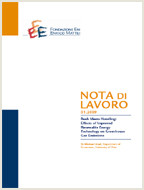Innovation Benefits from Nuclear Phase-out: Can they Compensate the Costs?

18.12.2012
Enrica De Cian, Samuel Carrara and Massimo Tavoni
H40, O33, Q40, Q55
Technological change, Climate policy, Nuclear phase-out
Climate Change and Sustainable Development
Carlo Carraro
This paper investigates whether an inefficient allocation of abatement, due to constraints on the use of currently available low carbon mitigation options, can promote innovation in new technologies and eventually generate welfare gains. We focus on the case of nuclear power phase out, when accounting for endogenous technical change in energy efficiency and in low carbon technologies. The analysis uses the Integrated Assessment Model WITCH, which features multiple externalities due to both climate and innovation market failures. Our results show that phasing out nuclear power stimulates additional R&D investments and deployment of infant technologies with large learning potential. The innovation benefits which this would generate and that would not otherwise be captured due to intertemporal and international externalities almost completely offset the economic costs of phasing out nuclear power. The technological change benefit depends on the stringency of the climate policy and is distributed unevenly across countries.
***
Suggested citation: Enrica De Cian, Samuel Carrara and Massimo Tavoni, Innovation benefits from nuclear phase-out: can they compensate the costs?, J Climatic Change, Volume 123, Issue 3-4, pp 637-650 http://dx.doi.org/10.1007/s10584-013-0870-9
